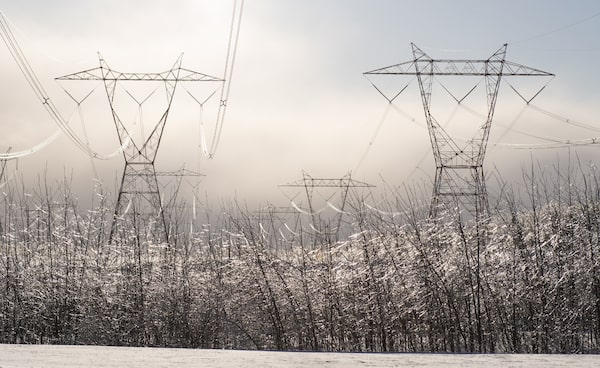
Frozen trees are seen under Hydro-Quebec power lines on Jan. 31, 2019 in Levis, Que.Jacques Boissinot/The Canadian Press
There is method to Quebec Premier François Legault’s sudden embrace of wind power in a province whose name is virtually synonymous with hydroelectricity.
As Hydro-Québec seeks to export its increasing power surpluses, the provincially owned utility faces stiff opposition from Indigenous groups and environmentalists that have lobbied U.S. policy-makers and voters to reject the new transmission lines needed to carry all those thousands of extra megawatts south.
Mr. Legault’s move this month to get behind an Indigenous-owned wind power project that he previously opposed is part of a goodwill effort aimed at blunting criticism that the province’s hydro riches have been earned on the backs of Indigenous peoples, whose ancestral lands have been flooded by massive hydro dams built without their consent.
Such criticisms have hurt Hydro-Québec’s claims to be “clean energy” provider as it competes with U.S. wind, solar and small-scale, run-of-the-river hydro producers for contracts to supply zero-emissions electricity to Massachusetts and New York.
Hydro-Québec’s U.S. partners already pulled the plug on one such proposed transmission project to carry 1,100 megawatts of Quebec power through New Hampshire, known as Northern Pass, in 2019 after the state’s top court sided with regulators in rejecting the line.
Canada’s largest electric utility has now placed its bets on the New England Clean Energy Connect, or NECEC, a 1,200-megawatt transmission line that the U.S. subsidiary of Spanish energy giant Iberdrola SA is seeking to build from the Quebec border through Maine. Most of the power shipped along the US$1.2-billion line would move onward to Massachusetts, under a 20-year deal with Hydro-Québec that has been stalled pending new transmission capacity.
Hydro-Québec has also teamed up with a unit of Blackstone Group to propose a US$2.2-billion transmission line under Lake Champlain and the Hudson River to supply New York City with renewable power under a call for tenders issued by Governor Andrew Cuomo. Hydro-Québec faces opposition to this project from within the province over its refusal to bury the Quebec portion of the line, even though its U.S. partners promise to do so on that side of the border.
Both projects could suffer the same fate as Northern Pass unless Hydro-Québec manages to overcome opposition from Indigenous groups that have embarked on an extensive media and lobbying campaign in New England in an effort to influence public opinion there.
NECEC received a presidential permit during the final days of Donald Trump’s administration, and President Joe Biden has set a goal of decarbonizing the U.S energy grid. But the project’s backers are still up against joint efforts by environmentalists and Indigenous groups to block the line. Maine’s secretary of state last week said her office had received a petition with more than 80,000 signatures seeking a statewide referendum on NECEC, more than enough to force such a vote and setting the stage for a hard-fought campaign this fall.
A coalition of Innu, Atikamekw and Anishnabeg leaders have also called on the Canada Energy Regulator and Prime Minister Justin Trudeau to block NECEC, arguing it flouts Ottawa’s constitutional obligations toward Indigenous peoples and the Liberal government’s commitment to implement the United Nations Declaration on the Rights of Indigenous Peoples.
“If Prime Minister Trudeau is serious about this commitment, [he] could force Hydro-Québec to put its export project to the United States on hold until compensation for the destruction of our ancestral lands has been negotiated with our First Nations,” Innu Nation Deputy Grand Chief Mary Ann Nui said in December.
The same month, Ms. Nui and other chiefs published a scathing op-ed in La Presse accusing Hydro-Québec of ignoring their demands for years. “Hydro-Québec’s long-standing contempt toward us forces us to henceforth air its dirty laundry in the United States, where it is counting on selling billions of dollars of electricity,” they wrote. “Our ultimate recourse consists of revealing to American society the immoral character of the electricity being offered.”
Hydro-Québec CEO Sophie Brochu, who took over from Éric Martel last April, responded to the hard-hitting missive by pointing to agreements signed to provide construction jobs and $500-million in contracts to Innu communities on the utility’s $8-billion 1,500-megawatt Romaine River hydro project, whose completion has been delayed to 2022 because of the pandemic.
“We are sensitive to questions relating to the ancestral rights of Indigenous communities,” Ms. Brochu added. “However, Hydro-Québec has neither the authority nor the legitimacy to recognize or not these rights. That is up to federal and provincial governments.”
Starting in the 1970s, previous Quebec governments reached compensation deals with the James Bay Cree related to hydro projects on their traditional lands. But as hydro development moved east to a remote North Shore of the St. Lawrence River, Innu leaders especially feel they have been ignored.
Mr. Legault’s move to back the $600-million Apuiat wind power project on the North Shore, a joint venture between eight Innu communities and Boralex Inc., marks a step by his Coalition Avenir Québec government to improve its relations with the Innu after campaigning in 2018 against Apuiat and dismissing calls to recognize systemic racism in the province. Hydro-Québec will purchase all of Apuiat’s electricity under a long-term supply contract.
The Premier will have to offer much more than that, however, for Indigenous groups to abandon their opposition to Hydro-Québec’s broader export ambitions.
Your time is valuable. Have the Top Business Headlines newsletter conveniently delivered to your inbox in the morning or evening. Sign up today.